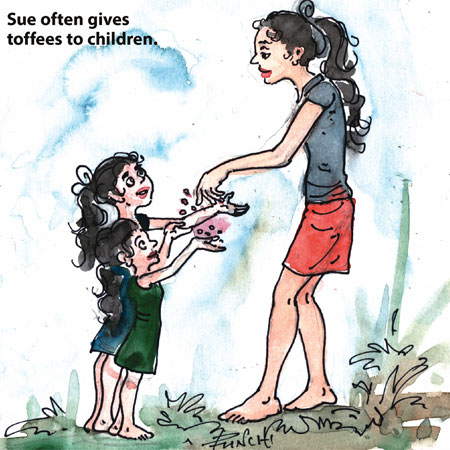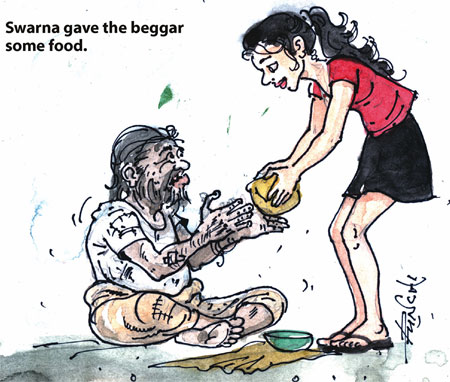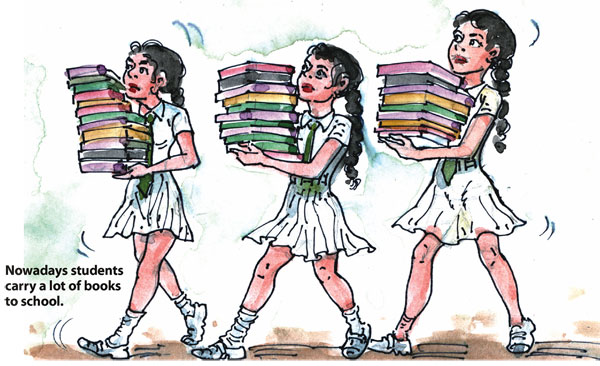|

by R. S. Karunaratne
Verbs with two objects
Most verbs have one object, but some verbs can have two objects. Two
different structures are possible.
First structure

Verb + person + thing
She gave me her dictionary.
May I show you my album?
Amanda wrote me a long letter.
Children, I am going to tell you a story.
I’ve bought you a pen.
I’ll send you the bill.
Shall I make you some coffee?
I lent Carlo my bicycle yesterday.
Mother often reads to Lucy fairy tales.
Mary teaches small children English.
Bala showed me his report.
Swarna gave the beggar some food.
I’ll buy you a camera.
Can you find me a house?
Could you give the principal this letter?
Diana has written to William a two-page letter.
Father wants to buy me an expensive pair of shoes.
Second structure
Verb + thing + person
Manel gave lunch to the beggar yesterday.
Can you deliver these parcels to the ABC Company?
She has made short-eats for everybody.
Send the money to him now.
She’ll make some coffee for all of us.
I lent my motorcycle to Abraham yesterday.
Mother reads stories to her children everyday.
Carol teaches French to poor children.
Hansani showed her stamp album to me.
Sue often gives toffees to children.

Can you buy a loaf of bread for me?
I want to find an annexe for my sister.
Can you give this letter to Andrew?
I posted a letter to Sam, but he didn’t reply.
Father wants to buy a car for me.
We do not use verbs such as “explain, say, suggest” or “borrow” in
the ‘verb + person + thing’ structure.
Can you explain this to me.
He said “Hello” to me.
I suggested how to reach the village quickly to him.
He borrowed Rs 1,000 from me.
Can I borrow a pen from you?
Match words and meanings
Here’s a novel method to enrich your vocabulary. Match the words in
column ‘A’ with their meanings in column ‘B’ and check your answers with
the key. The first has been done for you.
[Column A]
L 1. concurrent
.... 2. concussion
.... 3. condemn
.... 4. condense
.... 5. condiment
.... 6. condition
.... 7. condone
.... 8. confab
.... 9. confectioner
... 10. confer
... 11. confess
... 12. confidant
... 13. configuration
... 14. confine
... 15. confines
... 16. confiscate
... 17. conflagration
... 18. confound
... 19. confront
... 20. confuse
... 21. congeal
... 22. congenial
... 23. congested
... 24. congregate
... 25. conical
[Column B]
A. to reduce something in length
B. a person you trust
C. a large destructive fire
D. to accept behaviour that is wrong
E. to take a possession away from someone
F. to limit an activity
G. temporary damage to the brain
H. pattern of a group of related things
I. to exchange ideas
J. one who makes sweets
K. a substance you add to food
L. happening at the same time
M. shaped like a cone
N. to come together in a large group
O. crowded
P. friendly and pleasant
Q. to change from a liquid to solid
R. to mix up someone’s mind
S. to face a difficult situation
T. to confuse and surprise someone
U. the outer limits of something
V. to admit that you have done something wrong
W. an informal discussion
X. the particular state that someone is in
Y. to criticise someone strongly
Key:
2. G 3. Y 4. A 5. K 6. X 7. D 8. W 9. J 10. I 11. V 12. B 13. H 14. F
15. U 16. E 17. C 18. T 19. S 20. R 21. Q 22. P 23. O 24. N 25. M
Countable and uncountable nouns
A countable noun can be singular or plural.
Singular countable nouns
I can see a ship in the distance.

Amanda has a brother.
“I've got a problem,” said the child.
Shyma won a prize.
I am writing a letter.
Plural countable nouns
I like potatoes.
Can you wait here for five minutes?
We eat three meals a day.
Nowadays students carry a lot of books to school.
The car has four wheels.
We use ‘a’ or ‘an’ with a singular countable noun.
We saw a monkey sitting on the wall.
You need a bat and a ball to play cricket.
My school has a swimming pool.
Fernando carries an umbrella wherever he goes.
We saw an elephant crossing a stream.
An uncountable noun is neither singular nor plural. We usually do not
use ‘a’ or ‘an’ before it.
Can I have some water?
The cow is eating grass.
Do you have money to pay for your tuition?
She applied some butter on a slice of bread.
There is some milk in the bottle.
We use ‘some’ or ‘any’ with an uncountable noun.
Rex told us some jokes.
I don't know any jokes.
She drank some water before delivering the speech.
Do you have any money with you?
Put some more sugar into my cup of tea.
We use ‘many’ and ‘a few'’ with countable plural nouns.
I have read many books on Buddhism.
She has only a few friends.
Do you have many friends?
A few students attended school on the rainy day.
There are many workers idling in the workshop.
We use ‘much’ and ‘a little’ with uncountable nouns.
There isn't much work here.
There is a little milk left.
He doesn't drink much coffee.
She put a little oil into the lamp.
How much money have you saved?
[Activity]
Say whether the words in bold type are countable or uncountable.
1. A dog is coming behind me. (countable / uncountable)
2. She never eats meat. (countable / uncountable)
3. Do you play cricket? (countable / uncountable)
4. I had to wait there for 15 minutes. (countable / uncountable)
5. Just tell me one thing at a time. (countable / uncountable)
6. Love makes us happy. (countable / uncountable)
7. I wish you good luck in your new job. (countable / uncountable)
8. We need energy to do our work. (countable / uncountable)
9. We posed for a photograph. (countable / uncountable)
10. Would you like a banana? (countable / uncountable)
Key:
countable 2. uncountable 3. uncountable 4. countable 5. countable 6.
uncountable 7. uncountable 8. uncountable 9. countable 10. countable
Quiz on idioms
An idiom is a special kind of phrase. It is a group of words which
have a different meaning when used together from the one it would have
if the meaning of each word were taken individually. Tick the meaning of
each idiom in bold type and check your answers with the key.
1. If you quake in your boots ...
(a) you're very frightened
(b) you're very happy
(c) you're not sure what is going to happen
2. If you say that someone is hitting the bottle ...
(a) they are trying to break the bottle
(b) they are talking too much
(c) they are drinking too much alcohol
3. If a country's economy is bumping along the bottom ...
(a) it has reached a high level of performance
(b) it has reached a low level of performance
(c) it has reached a medium level of performance
4. If you get to the bottom of a problem ...
(a) you solve it by discovering the truth about it
(b) you fail to solve it
(c) you try to understand the problem
5. If a place is out of bounds ...
(a) you try to go there
(b) you're not allowed to go there
(c) you're allowed to go there
6. If a subject is out of bounds ...
(a) you're not allowed to discuss it
(b) you're allowed to discuss it
(c) you do not know what to do
7. If you pick someone's brain ...
(a) you hit them hard
(b) you criticise them
(c) you ask them for advice
8. If you rack your brains ...
(a) you think very hard about something
(b) you scratch your head
(c) you get very angry
9. If someone will not get a brass farthing ...
(a) they will get a lot of money
(b) they won't get any money
(c) they will get some money
10. If people get down to brass tacks ...
(a) they begin to discuss the basic aspects of a situation
(b) they begin to do something new
(c) they go back to the original place
Key:
1. (a) 2. (c) 3. (b) 4. (a) 5. (b) 6. (a) 7. (c) 8. (a) 9. (b) 10.
(a) |

